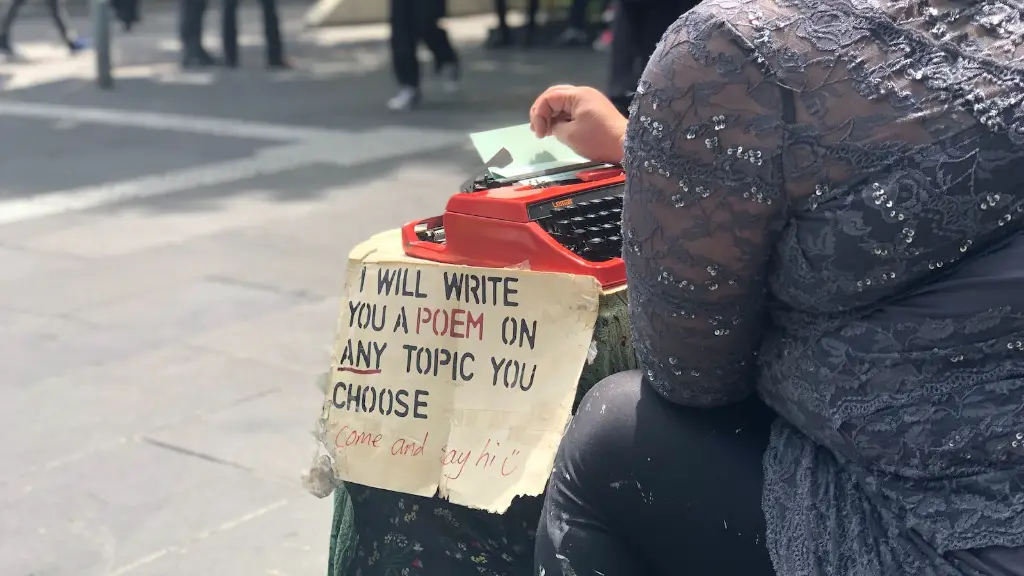Langston Hughes is a renowned American poet, author, and playwright. His work spanning seven decades has been highly influential in both the civil rights movement and in the development of African-American literature. One of Hughes’s best-loved poems is “Harlem,” which he wrote in 1951. The poem is highly symbolic and often interpreted to explore a variety of themes.
So why did Langston Hughes name his poem “Harlem”? It is widely believed that Hughes chose the name because he was fascinated by the vibrant culture of the Harlem Renaissance—a period of immense creativity and productivity among African-Americans. It was during this period (from 1919 to about 1940) that Hughes was producing much of his most important work.
Harlem was a place of immense opportunity at the time, and Hughes used the poem to explore the potential that Harlem held for African-Americans. The poem is a deeply introspective piece that has been hailed by experts as a vivid portrait of African-American life during this period. In it, Hughes poetically examines the hopes, dreams, and frustrations of Harlem’s residents in an effort to illuminate the beauty, complexity, and diversity of their culture.
In addition to the Harlem Renaissance, Langston Hughes chose the name “Harlem” to reference the African-American history of the neighborhood. It was in Harlem that African-Americans, who had been disenfranchised in many other parts of the country, could find economic opportunity and social acceptance. To Hughes, the name Harlem was a symbol of hope and progress – a reminder of the potential that African-Americans could achieve in spite of obstacles.
Hughes’s poem “Harlem” opens with the line “What happens to a dream deferred?” This line is often cited as a key question in exploring the themes present in the poem, as it forces readers to consider the disappointment and frustration faced by those who long for a better life but are unable to achieve it. This line also speaks to the sense of hope that is embedded in the poem – the idea that even though dreams are deferred, they need not be forgotten.
Ultimately, Langston Hughes chose the name “Harlem” for his poem to honor the struggles and dreams of African-Americans. Through his poem, Hughes sought to capture the richness and vibrancy of the culture that emerged in Harlem during the 1920s, while also highlighting the history of the area and its importance to African-Americans. The poem has gone on to become one of Hughes’s best-known works and is often studied in American literature classes and used as a tool for exploring the experience of African-Americans in the early 20th century.
Relevance of Hughes’s Poem to Today
The themes and topics explored in Langston Hughes’s poem “Harlem” remain relevant even today. In a world where racism and inequality still plague many aspects of life, Hughes’s poem acts as a reminder of why it is so important to continue the fight against oppression and reclaim the dreams and aspirations of African-Americans. The poem also speaks to the need to recognize the struggles and accomplishments of African-Americans and to work towards creating a more just and equitable society.
In addition, “Harlem” serves as a reminder of the impact and potential of African-American culture. By celebrating the varied experiences of African-Americans, Hughes’s poem seeks to inspire hope and resilience even in the face of adversity. By continuing to study and celebrate the poem and its message, we can continue to gain insight and understanding into the lives and aspirations of African-Americans throughout the decades.
Hughes’s Poem as a Message of Hope
Though Langston Hughes’s poem “Harlem” is largely rooted in a sense of despair, it also conveys a strong message of hope. In the poem, Hughes questions what happens to a dream deferred, but he never falls into hopelessness. Instead, he speaks to the need to cling to hope even in the face of adversity—to recognize the potential of tomorrow and never give up on the dreams of today.
For African-Americans in particular, the poem is a reminder of the power of defiance and perseverance. Even in a system where they were oppressed and denied their rights, Hughes and other African-American artists sought to celebrate and empower their culture. In doing so, they achieved something remarkable—a legacy of hope and resilience that endures even today.
Influence of Hughes’s Poem
The influence of Langston Hughes’s poem “Harlem” is far-reaching and undeniable. It has inspired generations of African-Americans to express their dreams and aspirations, and to continue striving for a better future. It has also been celebrated by scholars and analyzed in literature courses across the country, a testament to its enduring power and relevance.
And of course, the poem has been an inspiration to countless other poets and writers, who have used its themes and imagery in their own works. Hughes’s poem is a vivid reminder of the beauty and power of language, and of the capacity of words to inspire and empower.
Hughes’s Legacy Through Poetry
Langston Hughes’s poem “Harlem” serves as a lasting testament to the power of poetry. Through this poem, Hughes sought to capture the struggles, accomplishments, and aspirations of African-Americans throughout the decades. He also sought to emphasize the need to never give up on our dreams, no matter how difficult they may seem.
The poem has stood the test of time and remains an important example of the power of poetry to communicate ideas and stir emotion. It has also become an important part of American culture, inspiring generations of artists and activists to strive for a better world. In this way, Hughes’s poem “Harlem” will continue to be an inspiration and source of hope for years to come.
Conclusion of Hughes’s Poem
Through his poem “Harlem,” Langston Hughes sought to capture the vibrancy of the Harlem Renaissance and the hopes and dreams of African-Americans during this period. He chose the name of the poem to reference the African-American history of the area, and the potential and progress that African-Americans could achieve despite obstacles. The poem has stood the test of time and continues to be an inspiration to poets and activists alike. Through its message of hope and resilience, the poem will continue to inspire generations to come.



